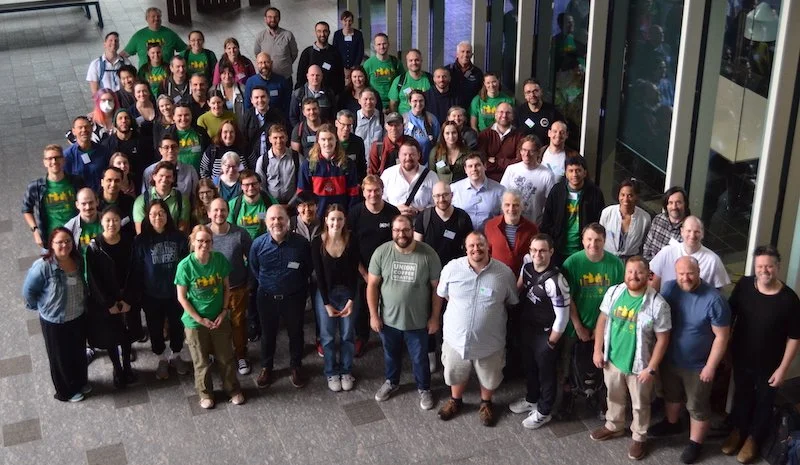Wrapping up the 2023 Galaxy Community Conference
We have just wrapped up the international Galaxy Community Conference for 2023, where over 130 delegates from 20 countries joined us in Brisbane and online to discuss the latest developments in Galaxy.
GCC2023's inspiring keynote speakers shared how they use Galaxy in their important research into biodiversity and structural biology.
Dr Carolyn Hogg, University of Sydney: To infinity and beyond – combining genomics and cloud technology to save our species
Dr Kate Michie, University of New South Wales: Alphafold2 and the Age of Deep Learning - Recent advances in structural biology
A/Prof Roberto Barrero Gumiel, QUT: Improving plant industry access to new genetics through faster and more accurate diagnostics of plant viruses and viroids
Galaxy Executive Board member, Michael Schatz, who is a Bloomberg Distinguished Professor of Computer Science and Biology at Johns Hopkins University was encouraged to see that:
“The keynotes really highlighted how Galaxy enables cutting edge science.”
Galaxy Australia team members from BioCommons, Queensland Cyber Infrastructure Foundation (QCIF), University of Queensland, Melbourne Bioinformatics and AARNet presented on topics ranging from monitoring tool health to developing the recently released Galaxy Australia Genome Lab. Dr Gareth Price, Project Lead for the Galaxy Australia service, said that:
“There was fantastic exchange between our team and international colleagues, and wonderful opportunities to engage with the global Galaxy community. GCC was an exhilarating experience and it was inspiring to be surrounded by like-minded people. The team left full of energy to keep improving Galaxy Australia and strengthen their collaborations with the wider Galaxy community.”
While we were hosted by Queensland University of Technology (QUT) at their fabulous facilities at The Cube, the ability to participate remotely was a critical factor in providing a truly international conference. Although he was part of the GCC2023 Organising Committee, Dr Prash Suravajhala, Principal Scientist, Systems Genomics at Amrita University, was unable to travel from India, but was:
“Very excited and happy to be a part of GCC2023 virtually. We witnessed scintillating talks and brainstorming sessions and the virtual attendance was a treat. This was a cherishing moment for me as I guzzled the talks from early morning India time! It has created a great camaraderie.”
Following four days of presentations and training workshops, a three day Collaboration Festival (CoFest) saw participants work on solutions and enhancements in a way that is only possible when the global team comes together. Members worked together to expand the Galaxy ecosystem, with contributions to Galaxy's tool set, documentation, training materials, code base, and much more.
The back of the GCC2023 conference T-shirt featured a tribute to Simon.
Simon Gladman, who was an original instigator and organiser of GCC2023, would have been so proud to see his partner and kids participating in the conference. Simon was remembered with several tributes and his legacy as an innovator, role model, supporter and community connector will continue to be honoured by the renaming of the “Intergalactic Data Commission” to “Simon’s Data Club” and by an annual award in his name.
All GCC2023 presentations will soon be freely available. If you’d like to receive the notification about recordings, and keep up with plans for GCC2024 in Brno, subscribe to the BioCommons eNews or Galaxy Announcements.



